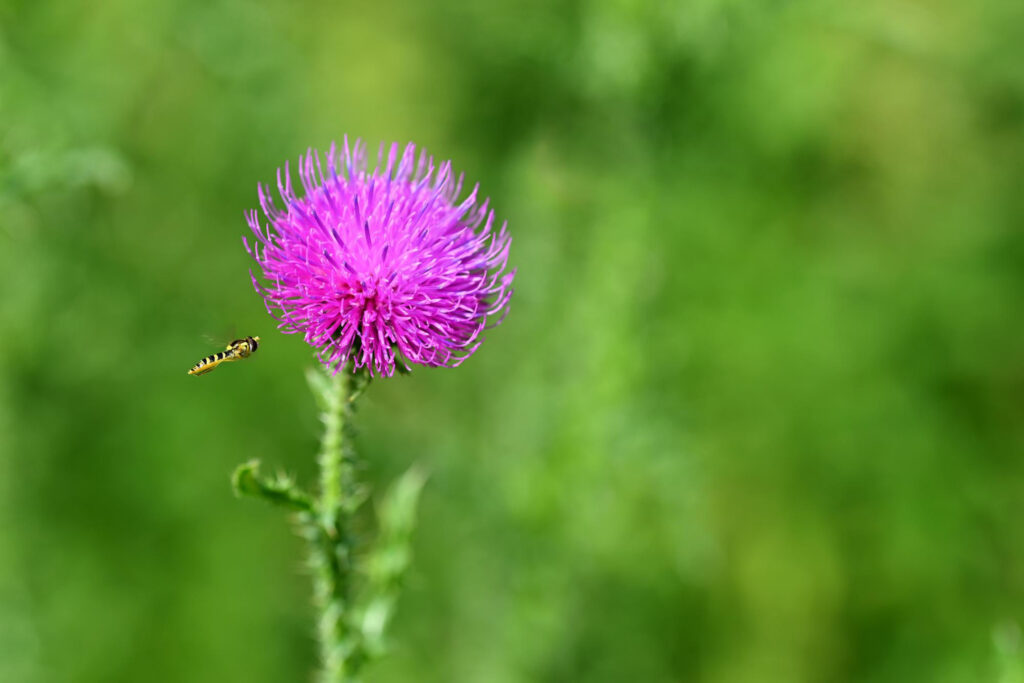
Introduction
Milk thistle, also known as Silybum marianum, is a plant that has been used for centuries in traditional medicine to treat a variety of health conditions.
One area where milk thistle has received a significant amount of attention is in its potential benefits for cancer patients. Some studies have suggested that the plant’s active ingredient, silymarin, may have anti-cancer properties, and that it may also help protect the liver from chemotherapy side effects.
However, while there is some promising research on the subject, it’s important to note that more research is needed to fully understand the effectiveness of milk thistle for cancer treatment. In this blog post, we will take a closer look at what we know about milk thistle and cancer, including its potential benefits, risks, and how to use it safely.
How milk thistle may benefit cancer patients
Explanation of the plant’s active ingredient, silymarin
Silymarin is a group of flavonoids that are found in the seeds of the milk thistle plant. It is the most well-studied and active compound found in milk thistle. Silymarin is known to have antioxidant and anti-inflammatory properties, which is believed to be responsible for the majority of its potential health benefits. It is thought to help protect the liver from damage caused by toxins, such as alcohol and certain medications. Silymarin also has been found to have an anti-cancer effect by inhibiting cancer cell growth and promoting cancer cell death. It is also believed to have the ability to help repair damaged liver cells, which can be beneficial for cancer patients who have undergone chemotherapy.
Read: What is milk thistle and what are its benefits?
Discussion of studies that suggest milk thistle may have anti-cancer properties
A number of laboratory and animal studies have suggested that milk thistle may have anti-cancer properties. For example, some studies have found that silymarin can inhibit the growth of certain types of cancer cells, such as breast cancer and prostate cancer cells, in test tubes. Other studies have suggested that silymarin may also be able to induce cancer cell death. However, it’s important to note that while these studies provide promising preliminary evidence, they do not prove that milk thistle can effectively treat cancer in humans. Most of the studies that have been conducted so far have been conducted in test tubes or in animals, and more research is needed to determine if milk thistle would be safe and effective for human use. Additionally, it’s important to note that Milk thistle is not recommended to be used as a sole treatment for cancer, it should only be used as an adjuvant therapy in conjunction with conventional treatment under the guidance of a healthcare professional.
Explanation of how milk thistle may help protect the liver from chemotherapy side effects
Chemotherapy is a common treatment for cancer and it can cause damage to the liver, especially if the drugs used in chemotherapy are metabolized in the liver. The liver plays an important role in eliminating toxins from the body, and damage to the liver can lead to a number of side effects. Some studies have suggested that milk thistle may be able to help protect the liver from damage caused by chemotherapy. For example, one study found that taking milk thistle before and during chemotherapy treatment reduced liver damage in people with colorectal cancer. Other studies have suggested that milk thistle may also be able to help repair damaged liver cells, which can be beneficial for cancer patients who have undergone chemotherapy. However, it’s important to note that while these studies provide some promising preliminary evidence, more research is needed to determine if milk thistle is a safe and effective way to protect the liver from chemotherapy side effects. Consultation with a healthcare professional is important before taking milk thistle in conjunction with chemotherapy.
Potential risks and side effects
Discussion of potential side effects of milk thistle, such as allergic reactions or interactions with other medications
Milk thistle is generally considered to be safe when taken as recommended. However, as with any supplement, there is the potential for side effects and interactions with other medications. Some of the potential side effects of milk thistle include allergic reactions, diarrhea, nausea, and headaches. These side effects are generally considered to be mild and short-lived. Milk thistle may also interact with certain medications, such as blood thinners, hormonal therapy, and immunosuppressants. It may also interact with certain herbs and supplements, such as St. John’s wort and dandelion. It is important to consult with a healthcare professional before taking milk thistle, particularly if you have a medical condition or are taking any medications. They may help you to understand the possible interactions and side effects.
Explanation of the lack of long-term safety data for milk thistle use in cancer patients
While there is some promising research on the potential benefits of milk thistle for cancer patients, it’s important to note that most of the studies that have been conducted so far have been short-term and have not looked at the long-term safety of milk thistle use in cancer patients. The lack of long-term safety data is a concern because cancer patients are often on treatment for extended periods of time. It is important to have information on the long-term safety of the supplements they take so that they can make informed decisions about their health. Additionally, it’s also important to note that many of the studies that have been conducted so far have been small, and more research is needed to confirm the safety and effectiveness of milk thistle for cancer patients. It is recommended that cancer patients consult with their healthcare professional before taking milk thistle, and follow the recommended dosage and duration of use. They may also need to monitor and report any side effects or adverse reactions to the healthcare professional.
How to use milk thistle
Recommendations for safe dosage and duration of use
The recommended dosage of milk thistle can vary depending on the specific product and the condition being treated. In general, most supplements contain between 70-140 mg of silymarin per capsule. It is important to follow the recommended dosage on the product label or as directed by a healthcare professional. As for the duration of use, most studies have used milk thistle for periods of four to twelve weeks. However, it’s important to note that cancer patients are often on treatment for extended periods of time, and more research is needed to determine the long-term safety of milk thistle use in cancer patients. It is important to consult with a healthcare professional before taking milk thistle, and follow their recommended dosage and duration of use. They will also be able to monitor for any adverse reactions or side effects.
Explanation of different forms of milk thistle available (e.g. capsules, tinctures, teas)
Milk thistle is available in a variety of forms, including capsules, tinctures, and teas. Each form has its own unique set of pros and cons, and it’s important to choose the one that best meets your needs.
- Capsules: Milk thistle capsules are a convenient and easy way to take the supplement. They are usually standardized to contain a specific amount of silymarin, which makes it easy to ensure you are getting the recommended dosage. Capsules can be found in various dosage strengths and you can choose the one that best meets your needs.
- Tinctures: Milk thistle tinctures are made by steeping the ground seeds in alcohol to extract the active compounds. They are easy to take and can be used under the tongue or added to water or juice. Tinctures are often considered to be more potent than capsules, but they may also be more expensive.
- Teas: Milk thistle tea is made by steeping the dried leaves and flowers of the plant in hot water. It can be consumed as a hot or iced tea. This form of milk thistle is less potent than capsules and tinctures, but it may be a good option for those who dislike the taste of capsules.
Read: Where can I buy milk thistle, and how much does it cost?
Conclusion
In conclusion, milk thistle has been traditionally used for liver health, and there is promising research that suggests it may have anti-cancer properties and may be able to protect the liver from chemotherapy side effects.
However, it’s important to note that most of the studies that have been conducted so far have been short-term and have not looked at the long-term safety of milk thistle use in cancer patients.
Additionally, more research is needed to confirm the safety and effectiveness of milk thistle for cancer patients. It is recommended that cancer patients consult with their healthcare professional before taking milk thistle, and follow the recommended dosage and duration of use.
Milk thistle is available in various forms such as capsules, tinctures and teas, each form has its own unique set of pros and cons, it’s important to consult with healthcare professional before taking in any form.
It is important to be aware of the potential side effects and interactions with other medications, and to report any adverse reactions to a healthcare professional.
Read:
- 5 foods that support liver health
- Liver disease: causes, symptoms, and treatments
- 5 Benefits of a Liver Health Formula
- The 5 Worst Foods for Your Liver
Image credit: Milk thistle photo created by wirestock – www.freepik.com











